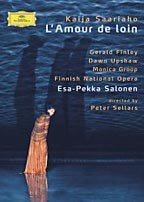When I wrote that opera was about love, it was just an observation. I made a list from a few opera plot books and picked out the ones that form the basis for opera theater repertoire throughout the world. And there it was. They are all about love with not one single exception.
With L'Amour de Loin ("Love from afar," Music by Kaija Saariaho and Libretto (in French) by Amin Maalouf) we have a new opera about love, and in its five years of existence it has already been presented in Salzburg, Santa Fe and Finland. The subject is longing, longing for someone else, for somewhere else, for an existence outside oneself. This is the opera for me.
It is a DVD from 2005 at the Finnish National Opera, so I am not required to see it all at once as I would in the opera house.
The opera has three characters:
- Jaufré Rudel, a troubadour living in a tower in Aquitaine has had many lovers and longs for love at a distance, for the far away, unattainable lover of ideals and dreams. He is sung by Gerald Finley, baritone.
- Clémence, countess of Tripoli, living in a tower in Lebanon, left Toulouse when she was five and has longed to return ever since. She is sung by Dawn Upshaw, soprano.
- The pilgrim longs to see the east, especially the holy land; sung by Monica Groop, mezzo-soprano.
There is also a chorus who take on the character of Rudel’s friends, his dubious friends, and other characters in the drama. The chorus is also part of the orchestration, much as it would have been in the writing of Debussy. There are two harps, also like Debussy.
All long for what they do not have. The pilgrim travels back and forth between them and is the cause of all that happens. Without the pilgrim they would sit in their towers alone and discontented.
This production is simple. The towers are represented by metal winding staircases. The pilgrim’s boat is small and white in the center. The stage is covered with a thin layer of water in which the boat sails and the pilgrim walks.
Rudel expresses his desire for a distant love, and he is overheard by the pilgrim, who relates a brief story about a woman in Tripoli that he saw one day. She was, “beautiful without the arrogance of beauty, noble without the arrogance of nobility, pious without the arrogance of piety." The hero is fatally fascinated and describes a complete imaginary woman.
Oh my.
Part II
The camera shows briefly the orchestra pit, and it contains what appears to be a standard opera orchestra. Modern pits allow for the possibility of players sitting under the stage.
This cryptic sentence:
4(2pic,afl).3(ca).3(bcl).3(cbn)/4231/timp.4perc/pf(kbd)/str
describes the instrumentation.
woodwinds/brass/percussion/piano/strings
kbd next to pf means it is an electronic keyboard, perhaps a synthesizer. All we see is strings, two harps and maybe some woodwinds on the other side. It could be a piece by Berlioz or Debussy they are about to play. The list above from G. Schirmer seems to have missed the harps.
I am worrying about this because this ordinary, only somewhat large orchestra, these ordinary opera singers and the hidden chorus are making music with no obvious link to the music of Papa Haydn who first formalized the makeup of an orchestra. Once the ordinary looking conductor with his ordinary baton gives the downbeat, we don't see the orchestra any more. The singing is relatively ordinary, too, without too much irrational leaping about, a common feature of modern opera. There are even occasional trills and small ornaments such as an opera singer might do.
There is throughout the work no apparent meter. Instruments, themes, melodies sneak mysteriously into the stream of sound, play for a while and just as mysteriously depart. It is a sea of sound rather more like the ocean than Haydn. Or perhaps more like the Mediterranean Sea where the action takes place.
Part III
We come to opera for the ecstasy. Now I begin to fear that our hero who has stepped into the boat and is making his crossing to Tripoli will find at the other side that the love from afar is the only one that will sustain the ecstasy forever, that the reality of a real lover will pale beside it.
What is opera without passion? Has the fear of annihilation any chance beside it?
L'amour de loin is uncompromisingly modern and in spite of that may well be a masterpiece. Only its extreme difficulty would prevent it from becoming standard repertoire.
The visual images in this dvd are haunting. Perhaps I will buy it after all.
#ad













No comments:
Post a Comment